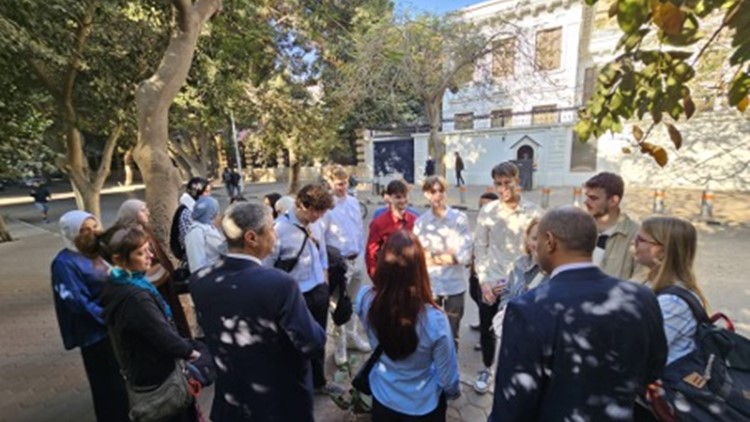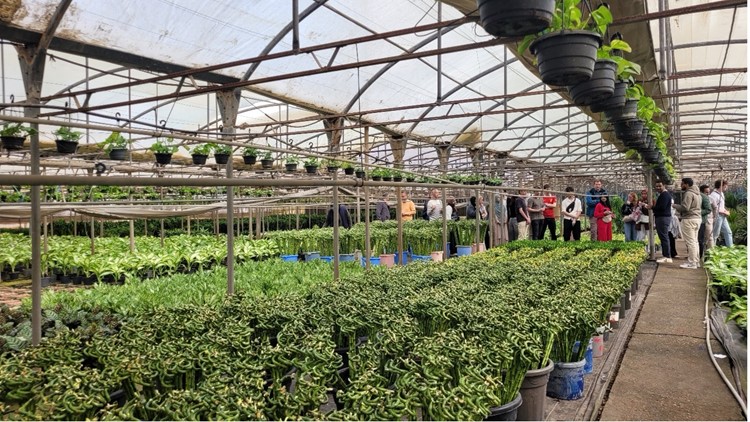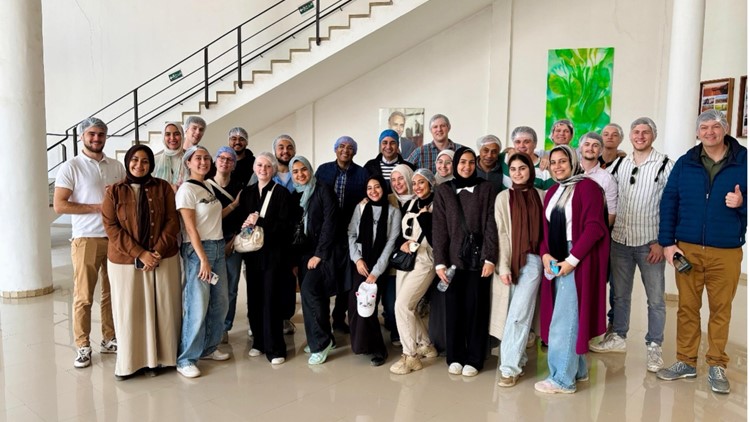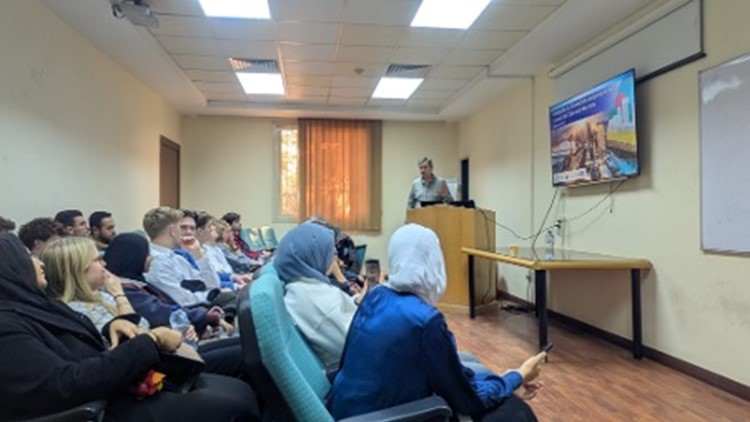Project overview
Collaboration
Institute of Built Environment (WAM - Watermanagement)
Cairo University (Faculty of Agriculture)
Run time
August 2022 - July 2025
Mobility types
Staff mobilities (incoming and outgoing)
One semester student exchange (incoming)
Short term student exchange (incoming (funded))
Short term student exchange (outgoing (unfunded))
Activities
Dates:
Ongoing
Activities:
CU students can enroll in the minor program ‘Creating Resilient Cities’’, which runs twice a year at RUAS. By completing the minor the CU students will get 30 ECTS.
Three students from Cairo University came to RUAS to follow this minor. RUAS provided them with housing and they received a full Erasmus+ grant for the 5 months they spent in Rotterdam.
Dates:
January 2023
January 2024
January 2025
Activities:
Due to the geographical distribution of waterways in Egypt, the country deals with environmental and water related challenges. During the ClimateCafé Cairo and Nile Delta, Egyptian and Dutch Water Management students collaborate in an international and multicultural context to combine knowledge and assess local water related issues. At the end of the week, the groups present their work and offer strategies to solve the issue of their chosen project to tutors, participants from previous ClimateCafé’s and the Dutch embassy of Cairo. The students hand-in a bilingual (Arab and English) video, you can view a selection of these videos here. Every edition, a new group of students and 3 RUAS tutors travel to Cairo for this event. The students receive a certificate of attendance.
Dates:
January 2023
December 2024
Activities:
The Water Management bachelor programme of the School of Built Environment has hosted two international weeks that tutors from various partners and Erasmus+ projects (South-Africa, Phillipines, Indonesia, Cape Verde, Poland, Madagascar, Egypt) attended. The programme of this active week consisted out of lectures, knowledge exchange on water management and visits to local partners such as EMI and Blue City.
Dates:
April 2025
Activities:
In April RUAS invites 10 students and 4 tutors from Cairo University in Egypt to Rotterdam. The ClimateCafé will last for 2 weeks and is fully funded for the incoming invitees.
Why did we develop this project?
The city of Rotterdam is located in a river delta, below sea level. A lot of investments and projects have been implemented in Rotterdam by the national government, the city of Rotterdam, and regional water authorities to better manage excess and shortage of water resulting in floods or droughts. The local waterboards are actively involved in the course program Water management at Rotterdam University of Applied Sciences (RUAS) by providing technical and governance expertise. Egypt and the Nile delta are one of the priority areas for international cooperation for Dutch water authorities. The specific system of Dutch water governance enables the Dutch to survive below sea level. The challenges of climate change such as increased periods of heavy precipitation, rising sea levels, and draught pose a serious threat to the Rotterdam region. Rotterdam has to adapt to survive. Recently periods of extreme droughts and heatwaves in summer 2018 were a wake-up call for the Netherlands that we should be better prepared for future climate change, also for droughts and saltwater intrusion. 55 percent of the Netherlands is at risk of flooding; 26 percent of the country is below sea level, and 29 percent is susceptible to river flooding.
RUAS and the specialization of urban Water Management was established in 2007. The School of Built Environment runs the study program Water Management, which has a focus on delta technology, delta design, and delta management. The Nile delta was selected by the course Water management as one of the focus deltas which integrates urban development, water management and food production.
Egypt, known as a desert country with limited precipitation is also extremely vulnerable to climate change. According to the Intergovernmental Panel on Climate Change (IPCC), Egypt’s Nile Delta is one of the world’s three extremely vulnerable hotspots, and future projections indicate that Egypt will suffer from the following climate change impacts: sea-level rise; water scarcity and deficit; and an increase in the frequency and intensity of extreme weather events such as heatwaves, flash floods, heavy rains, sand and dust storms . The Delta and the narrow valley of the Nile comprise 5.5 % of Egypt’s area, house over 95% of its people, 30-40% of its agricultural production, and 50% of its industrial production . Egypt’s population of 96 million is predicted to rise to about 150 million by 2050, with no commensurate expansion in water resources.
Cairo University's Faculty of agriculture deals with the agricultural production and governance aspects of Egypt’s water management and ensuring sufficient food production in Egypt. The Faculty of Urban and Regional Planning is committed to monitoring, developing, and promoting the best practices and understanding the society needs to create more liveable cities. During the fourth edition of Cairo Water Week (CWW) in October 2021, Egypt’s Minister of Water Resources and Irrigation Mohamed Abdel Aty pointed out the importance of concerted global efforts to deal with the challenges related to the most scarce and most important resource ever, which is water. “Without this cooperation, no country will be able to face these challenges alone because we live in one world and a common destiny.”
RUAS runs 2019 a new module called ‘No water no food’. The focus of the module is the Nile delta, food production, and the importance of the Nile for the food production and economy of the countries along the Nile River. CU and RUAS have decided to develop and organize a joint ClimateCafé module, which is a 1-2 weeks pressure cooker, in which Egyptian and Dutch students work in mixed teams on multidisciplinary challenges where climate change, agricultural water management including; water pollution, water preservation, food production, and nature-based solutions, which are the central focus. The new joint module will be developed with case Cairo and the Nile delta as a focus in which Dutch and Egyptian students work together in mixed teams. The Netherlands and the Rotterdam region are interesting case studies for CU on how to survive in densely populated areas, below sea level. For RUAS it is very important to provide a context-rich learning environment for the students and to integrate case studies in other parts of the world in the curriculum so that students will be able to apply their knowledge in other contexts. For these reasons, CU and RUAS will exchange staff members and CU students to participate in the ClimateCafé.
Testimonials
Climate Café was truly an amazing, unique, and different experience. Through it, I was able to discover more about myself, learn about different cultures, and expand my social circle. It also gave me more aspirations for the future, helped me in my field of study, and allowed me to connect with places and people that wouldn’t have been easy to access as a student.
I learned about Boyan Slat, the incredible Dutch young man whose graduation project provided a solution to water pollution—he truly inspired me. I also realized that sharing ideas with others leads to innovative and brilliant thoughts. I got to know so much about the Netherlands, like how they rely on bicycles as a primary mode of transportation, that Egypt’s winter weather is considered summer in the Netherlands, and even about their old traditional wooden shoes (klompen). We also exchanged languages and food, and I learned a little Dutch… Ik hou van je, haha!
I can’t say that I had a single favorite part because the entire week was incredible—I wish it had lasted longer! I loved visiting Cairo Tower and seeing Egypt from above, going to Alexandria to enjoy the sea breeze and fresh sugarcane juice, and walking through Al-Azhar Park, where brides were everywhere, and the joyful ululations filled the air. Even on the bus, we had fun singing, chatting, and playing games. And of course, I absolutely enjoyed the food, haha! Visiting the farms and experiencing hands-on learning rather than just theory was also amazing. Honestly, every moment of Climate Café was fantastic!
Climate Cafe was een hele mooie ervaring door het ervaren van een heel ander land, andere mensen en een totaal andere cultuur. Deze unieke ervaring heeft zeker impact op mij gemaakt. Door de wereld te bekijken uit een ander standpunt. De farms waren leerzaam om te zien hoe ze nou zo iets kunnen verbouwen en welke technieken ze hier voor gebruiken. En dus met watertekort te kunnen omgaan en zuinig en efficiënt met het water omgaan. Mijn favoriete momenten was het praten met de egyptische studenten om zo de cultuur te leren kennen en de schoonheid van Egypte te zien met eigen ogen!
Climate Cafe was an amazing experience! It was a unique opportunity to connect with students from the Netherlands, and I truly enjoyed every moment. The program was well-organized, and it provided a platform for cultural exchange and collaborative learning. My favorite part was the boat trip we took together in Alexandria, it was such a fun and memorable experience. I also really enjoyed sharing our food with the Dutch students,especially when we went to Bazoka and they saw the size of the chickens, they were so surprised and said they were the size of dinosaurs!, it was so funny! Moments like these made the experience even more special.
Through Climate Cafe, I learned a lot about water management, particularly hydroponic systems and how they are used in Egyptian farms. It was fascinating to see how these systems optimize water usage. I also enjoyed learning about the different types of vegetables we plant and how they are grown naturally without chemical pesticides. Visiting the farms and seeing these practices firsthand was both educational and inspiring.
Working with the Dutch students was an incredible experience. I really enjoyed collaborating with them, and I hope we can meet again in the future. Our team was very integrated, and each member brought unique skills to the table. This allowed us to support one another and deliver something wonderful by the end of the program. I also had so much fun playing the Egyptian game TISSUE with them at Alazhar Park, it was impressive when they won against us! The experience taught me the value of teamwork, communication, and cultural understanding in an international setting. It was a truly enriching experience that I will always cherish.
Overall, I’m grateful for the effort everyone put into making Climate Cafe so perfect and impactful.
It was such a beautiful experience, I learned a lot from dutch students, also i has the opportunity to learn more about water management in Netherlands, I heard about Boyan Slant, the Dutch inventor, I didn't know about him before.
What was interesting and new for me was the polder system in Holland, the hydroponic farming, grafting, many companies in Egypt that I heard of for the first time, And of course, I learned about the relationships established between the Netherlands and some Egyptian companies or farms.
For me each day in the week was my favorite, I woke up every day during that week confident that I was going to have a special experience.
I enjoyed the time I spent meeting new people, experiencing new information, and even enjoying the different Egyptian and Dutch music that I listened to every day.
At the beginning, the atmosphere at Climate Café was comfortable and interactive, with a great exchange of information among everyone. The topics discussed were truly fascinating, and one that particularly caught my interest was water management. I was really impressed by the water management system in the Netherlands and how efficiently they handle their water resources.
Through discussions with students specializing in this field, I gained valuable insights into the innovative approaches used in the Netherlands, such as advanced flood control systems, water recycling techniques.
Experiencing this discussion in an international setting allowed me to see how climate solutions vary across regions and how collaboration and shared knowledge can lead to better approaches for global sustainability
"I also benefited from my visit to farms in Egypt and how they apply technology in agriculture to achieve higher productivity with the best quality while using the least amount of water possible.
As for the best part of the week, it was the time we spent on the bus, exchanging conversations and learning about each other's cultures. I also enjoyed the moments we spent as friends, walking through the streets of Egypt and having fun together.






